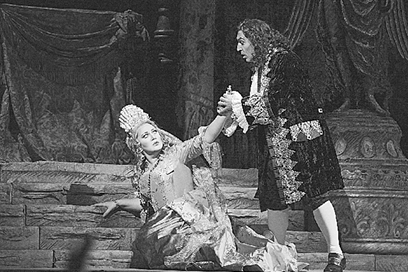Matching suitable performers to roles at The Metropolitan Opera
The first weeks of the Metropolitan Opera’s season suggest that the real challenge facing new General Manager Peter Gelb is not so much glossy new productions but rather interesting and appropriate casting of revivals.
Take, for example, the October 6 performance of Gounod’s “Faust.” Here we have an opera whose plot revolves around the decision to regain one’s youth. Representing the supposedly irresistible younger generation were the comfortable, reliable tenor Ramón Vargas and soprano Ruth Ann Swenson. When Faust finally persuaded Marguerite to yield to sexual passion, these two behaved like a middle-aged married couple settling in for an evening of Netflix.
Their singing, too, lacked fire. Vargas boasts an easy top all the way up to a beautiful high C in “Salut, demeure,” but his phrasing lacks imagination or sweep. Swenson’s voluptuous lyric soprano sagged flat most of the night, and even in the “Jewel Song” she never sparkled.
Swenson is an established presence at the Met; few would question her right to sing leading roles there. But whose idea was it to cast the unformed and underwhelming young Ildar Abdrazakov in one of opera’s showiest vehicles, Méphistophélès? The voice is solid enough, but there emerged from his performance not a hint of star quality, or, for that matter, evil.
The generic barihunk Tommi Hakala managed to emit recognizable French vowels perhaps a half-dozen times in three hours. A far more interesting artist is Karine Deshayes (Siébel). Alone of the principals this mezzo had a firm sense of Gounod’s style, lending crisp rhythm to the aria “Faites-lui mes aveux.” Not surprisingly, Deshayes’ approach coordinated with that of the conductor Bertrand De Billy—sweet, but never syrupy.
De Billy enjoyed an even greater success leading Ponchielli’s “La Gioconda” on September 30. He never allowed this sprawling work to lose its shape, keeping the orchestra textures lean and taut. His brisk way with the score flattered the less than ideally Italianate approach of the soprano Violeta Urmana to the title character. Urmana is more naturally an Ariadne than a Gioconda, but she is patently an intelligent artist who has mastered every technical intricacy of a very demanding role. She even manages to simulate the lurch-and-stumble acting style with dignity.
It was a women’s night, since the other two standouts in the cast were the two mezzo-sopranos. Olga Borodina flooded the theater with her chocolaty tones as Laura, leaving the audience wishing she had a more substantial role. Let’s hear her as Santuzza soon! As Gioconda’s hapless mother La Cieca, Irina Mishura sang with rich, dignified contralto tone. Her over-the-top blind-lady act garnered a snicker or two from the gallery, but the laughter seemed good-natured. At least she was trying.
Of the men, only Željko Lucic (Barnaba) merits attention for his exciting snarl. It would be interesting to hear him in a part that required lyricism; if he can manage that as well, he will be a valuable addition to the Met’s skimpy roster of Verdian baritones. Guest dancer Ángel Corella won the evening’s biggest ovation for a performance that consisted of little more than a series of pirouettes à la seconde, but boy did he look like a star doing them!
This “Gioconda” is the oldest production in the Met’s repertoire, devised by Margherita Wallman and Beni Montressor for the company’s first Lincoln Center season in 1967. And yet it holds up far better than the brainless “Faust” that Andrei Serban foisted on the Met just last year. The illogical, garish antics of this production are enough to make the notoriously murky melodrama of “Gioconda” seem a model of classical restraint.
James Jorden is the producer of the podcast “Unnatural Acts of Opera” at http://parterre.com.
gaycitynews.com
































